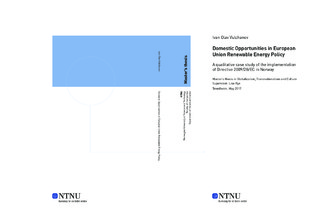Domestic Opportunities in European Union Renewable Energy Policy - A qualitative case study of the implementation of Directive 2009/28/EC in Norway
Abstract
The adoption and implementation of the second Renewable Energy Directive (2009/28/EC) in Norway is an example of how the domestic public and private sector interests of an EEA/EFTA state have responded to the EU climate and energy legislation. This thesis aims to discuss the nature of these interests and analyse how they have influenced the Directive’s implementation and adoption process. This is done through a chronological analysis of the three phases of that process – the assessment phase, the negotiation phase and the implementation phase. The various interests and actors that have been identified in the analysis have in turn provided the basis for the theoretical discussion in the thesis, which builds on concepts from rational choice institutionalism, sociological institutionalism and two-level game theory. The current findings demonstrate the Norwegian authorities were in a position to use the directive as a means of countering domestic critique and to their advantage. Furthermore, the business circles in Norway have displayed a positive attitude towards the directive and have used normative arguments in favour of its implementation. However, the authorities’ concerns concerning the feasibility of achieving the directive’s target, have complicated the process of assessment. Still, given that the EEA Agreement governs the nature of EU law adoption in Norway, all the factors above have exerted their influence within the limitations of the legal framework.
